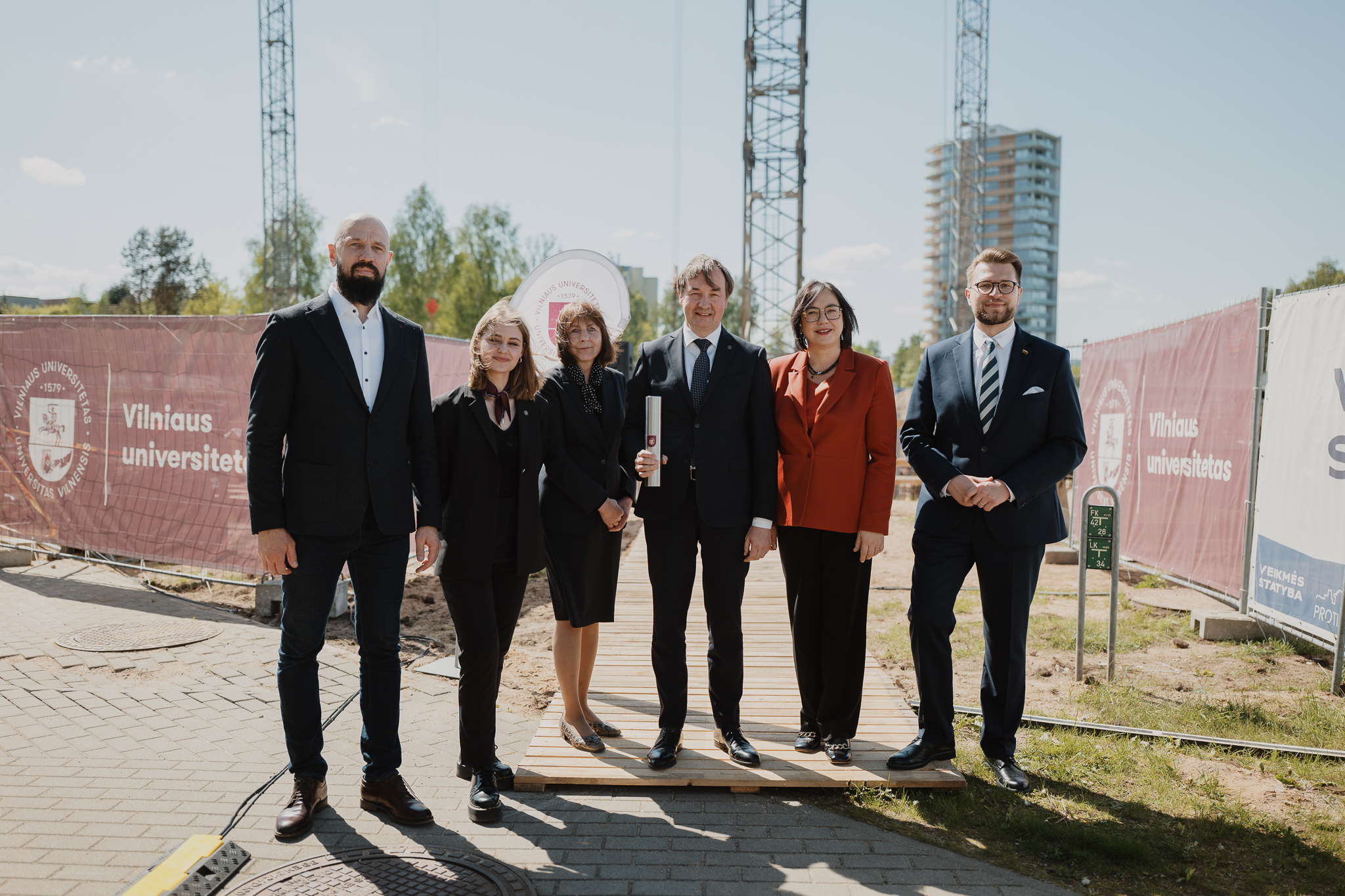A Symbolic Time Capsule Ceremony Launches Construction of the New VU Faculty of Chemistry and Geosciences Building

On 21 May, a symbolic capsule-burying ceremony officially marked the beginning of the construction of the new Vilnius University (VU) Faculty of Chemistry and Geosciences in Sunrise (Saulėtekis) Valley, Vilnius.
The new building will house both the Faculty of Chemistry and Geosciences and the Translational Gene Technology Competency Centre of the VU Life Sciences Center. Covering more than 12,000 square metres, the territory will feature modern, state-of-the-art infrastructure and experimental facilities tailored to the training of specialists in chemistry, biochemistry, pharmaceutical chemistry, and chemistry of nanomaterials, all in line with contemporary standards. The new building will enable the successful and smooth execution and implementation of international science and technology projects, strengthening Lithuania’s competitiveness on both the European and global stages.
‘Today, we symbolically mark the beginning of the construction of the new Faculty of Chemistry and Geosciences. It is highly significant that the new building will be constructed in Sunrise Valley, adjacent to the Life Sciences Center and the National Center for Physical Sciences and Technology. Concentrating intellectual and research infrastructure in one location will undoubtedly foster deeper interdisciplinary cooperation, introducing another key scientific hub to the Sunrise campus. We are ready to continue demonstrating that timely investments in science yield great returns. At the same time, this project is also a contribution to the upcoming 450th anniversary of Vilnius University,’ said VU Rector Professor Rimvydas Petrauskas.
The new five-storey building is expected to house all six departments of the Institute of Chemistry of the VU Faculty of Chemistry and Geosciences. A complex of auditoriums, administrative offices, and laboratories is planned across four building floors.
The new building offers new opportunities
Raminta Popovienė, Minister of Education, Science and Sport, called the construction of the new building a powerful message to future generations:
‘Both chemistry and geosciences are vital in helping us answer fundamental questions about the universe, creation, and emerging technologies.’
‘The fact that this new building is being constructed today represents new opportunities that come from within the University community. You are the ones who clearly understand that, for Lithuania to have new opportunities, we must first create them for students, teaching staff, and the academic community as a whole,’ added the Minister.
Lukas Savickas, Minister of the Economy and Innovation, expressed his enthusiasm about VU becoming a national hub for scientific excellence:
‘The site already brings together life sciences, technology, and physics – and soon, it will also include chemistry. We will have a hub of knowledge and competence in the fields that are critical for achieving our ambitious goals and transforming our economy,’ stated the Minister.
The new building will include nine auditoriums to accommodate Bachelor and Master studies, along with five teaching laboratories for practical student work. It will also become home to 14 independent research groups whose scientific topics and projects extend beyond chemistry into interdisciplinary areas, combining physics, biomedicine, geology, and pharmaceutical sciences.
‘We will have a new facility designed for high-quality studies within a well-equipped environment. We truly hope this building becomes more than just a structure – a space that brings together the University community and students,’ said Klėja Merčaitytė, President of the VU Students’ Representation.
The new laboratories will support research on supramolecules, synthetic cofactors, photo- and electroactive organic materials, polymer brushes, elastomers, immune sensors, functionally active nanoparticles, multicomponent metal oxides, thin-film functional materials, and other relevant areas.
Significant interdisciplinary partnership
Located on the fifth floor, the Translational Gene Technology Centre will bring together advanced scientific equipment clusters and interdisciplinary expertise in gene editing, genomics, bioinformatics, cell technologies, and more.
‘It will be a space where scientists collaborate to develop advanced technologies for diagnosing and treating hereditary genetic and oncological diseases. This kind of partnership between researchers in chemistry and life sciences will not only drive new fundamental discoveries but will also accelerate the translation of research into practical applications for human health,’ noted Virginijus Šikšnys, Professor at the VU Life Sciences Center.
‘And more than that,’ he added, ‘the relocation of chemists to the Sunrise campus will bring together the country’s leading scientific talent in physics, chemistry, and the life sciences. Such a cluster will increase our international visibility, attract talented students from Lithuania and abroad, and encourage business investment in research and innovation.’
The emergence of the new centre is expected to enhance the competitiveness of Lithuanian scientists and attract international partners, including biotechnology and pharmaceutical companies. Its advanced equipment and interdisciplinary expertise will also provide favourable conditions for the development of start-ups and ensure the sustainable development of the competence centre in the future.
The construction of the new building is projected to be completed in the third quarter of 2026.